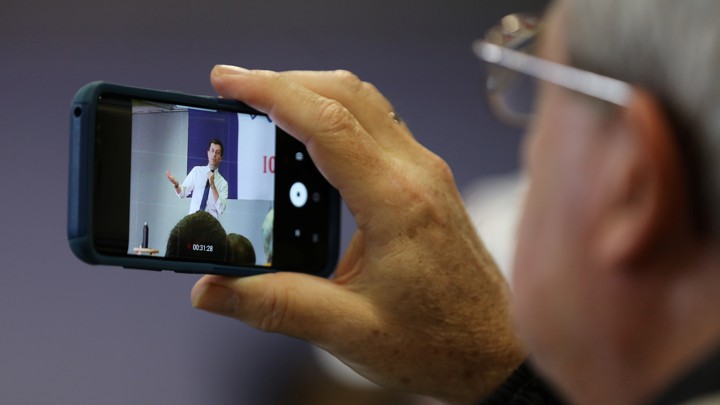
Young progressives on the internet don’t seem to like Pete Buttigieg very much. They’ve called him “the obnoxious type of Millennial
” and “a Boomer wrapped up in a Millennial’s clothing
”; a “Build-a-Bear for middling Democrats
” and “a candidate seemingly dreamed up by some Democratic National Committee algorithm
”; a “baggie full of uncut special interest talking points
” and a “grab bag of gifted-and-talented party tricks
.” Buttigieg is a young person’s idea of an old person—and, evidently, some sort of bag.
The online left is not the electorate, and its views don’t represent a generation of voters. But youthful distaste for Buttigieg isn’t an internet illusion. In a recent Quinnipiac poll, Buttigieg placed second in the Democratic field among voters over 50. But he earned just 2 percent support among voters under 35. His popularity among those aged 35–49 is about as high as his overall numbers. Buttigieg hate is tightly concentrated among the young.
John McWhorter: The woke attack on Pete Buttigieg
This level of is vitriol is confusing, for several reasons. Buttigieg, 37, would be the youngest elected president in American history. Nobody ought to vote for Buttigieg (or anyone, for that matter) just because they almost share a birth date. But one might think that historic youthfulness would be enough to buy him at least, say, three whole percentage points of the national youth vote.
What’s more, Buttigieg receives the sort of scrutiny one might expect from a front-runner despite being way behind in national polls. Joe Biden represents the far greater threat to the young left’s favored candidate, Bernie Sanders. But Biden seems to avoid much of the highly personal animosity heaped on his co-runner in the competitive lane of B-Surnamed Moderates.
What’s going on here? Let’s begin with the most straightforward explanation.
1. Don’t overthink it: They hate him because he’s not a socialist—and his early-state poll numbers are rising.
This is the obvious answer and, frankly, it might be the only answer. In the past two months, no candidate has gained more than Buttigieg in the early states. If he wins in Iowa and New Hampshire, he could block Bernie Sanders’s path to the nomination. And this deeply concerns young progressive activists, who rightly see the Democratic primary as a zero-sum competition to lead the party in a winnable election that has the potential to redefine the Democratic platform for a decade or longer. Buttigieg, far more than Biden, has the youth and vigor to command the party for the next generation. And this makes him the graver threat to those arguing for a socialist revolution.
This explanation takes us pretty far. But I’m not sure it quite captures the level of sulfuric hate in the progressive objections to his candidacy.
2. Keep not overthinking it: They also hate him because they think he’s a liar.
There’s no question that Buttigieg, glimpsing an opening in the moderate lane, has tacked toward the center in the past few months. He initially seemed to support Medicare For All, and now he openly criticizes the effect it would have on private-insurance employment. He initially proposed radical government reforms such as packing the Supreme Court and removing the filibuster, but now he’s recast himself as a moderate unifier. As a result, the left sees him as not just any moderate, but as a moderate masquerading as a wunderkind grassroots progressive. When my colleague Elaine Godfrey spoke with a Sanders supporter in North Carolina, he told her that Buttigieg “threatens to put a fresh face on the most nakedly cynical underbelly of the post-triangulation Democratic Party.” For the young left, political moderation might be a misdemeanor; but eloquent moderation donning the costume of progressive activism is first-degree phoniness that merits the punishment of crude criticism.
3. Overthink it a little bit: Young people hate him because he’s a traitor to his generation.
Generational identity is arguably the most important dividing line in the Democratic Party—more than class, race, or education. As I’ve written, the young left has become a kind of third party awkwardly domiciled within the Democratic Party. Buttigieg, however, is a traitor to his generation; he is a 30-something Millennial who appeals mostly to middle-aged and older white voters.
In this way, his candidacy violates a certain unwritten law of U.S. electoral politics. American voters have historically appreciated candidates who, from a socioeconomic perspective, identify “down”: Franklin D. Roosevelt was a traitor to the upper class; Trump is the real-estate billionaire who speaks for coal miners; Bernie Sanders is the septuagenarian senator who rallies the young left. But there’s not a deep history of successful candidates who appeared to identify “up,” like a young, nonmillionaire, small-town mayor who aligns himself with cosmopolitan capital. Identifying down can be a proxy for authenticity, but identifying up invites accusations of inauthenticity. By rejecting young progressive activism, Buttigieg betrays his generational-class identity.
4. Overthink it more: Young people project an extreme hostility toward Buttigieg on the internet in part to exorcise their own anxieties about success and increase their in-group status.
This week, I tweeted that the stark age gap of Buttigieg’s support suggests that he performs a specific archetype in this race: “your polite, hyper-achieving high school friend, who delighted the parents at that Christmas party with his piano rendition of Silent Night, which made your friends roll their eyes so hard their retinas detached.”
Older and richer educated liberals look at Buttigieg and see a flattering reflection of their young selves or offspring. Young educated liberals look at Buttigieg and see a nauseating caricature, not of the person they are, or even the person they wanted to be, but of the person they’ve felt pressured to emulate but never quite became—an outcome they regard with tortured ambivalence. Buttigieg is the guy they hated in college, not only because he was obnoxiously successful, but also because his success sat uncomfortably, hauntingly close to the version of success they once felt prompted to achieve.
Read: What Pete Buttigieg says he did at McKinsey
This was the subtext—to me, anyway—of a highly celebrated New York Times magazine column in April by Jay Caspian Kang, which tagged Buttigieg as a kind of polymathic Frankenstein “who seems most intent on dazzling the country with his academic feats of strength.” The headline read: “Pete Buttigieg’s Meaningless Erudition Made Him the ‘Smart’ Candidate.” Fair enough. But for The New York Times to publish this critique is like Garden & Gun magazine running a long feature on the existential emptiness of cheesy grits. The column indicts readers for delighting in the very sensibility that they subscribe to the publication to enjoy. I have nothing against Kang, erudition, meaninglessness, or, above all, cheesy grits. But it is, shall we say, telling to discover a critique of conspicuous well-roundedness within a publication with approximately 10 pull-away subsections on arts, travel, business, and foreign affairs.
This is a perhaps too-long-winded way of saying that much of the ire that Buttigieg inspires among the young educated left is a resentment of the small difference. He is annoying to young people not despite his youngness, but because of it. He is a disappointment to the progressive queer community not despite his gay marriage, but because of it. He is irksome to the overeducated media not despite his educational pedigree and off-the-charts verbal intelligence, but because of both. The diverse and angry and hyper-educated Millennial-and-Gen-Z cohort are a rising power on the cusp of a potentially seismic moment in American political history, and their most successful representative is a candidate who, it turns out, doesn’t really represent them.
So this is my grand unifying theory of loving and loathing Pete Buttigieg. The South Bend, Indiana, mayor doesn’t offer any kind of New Deal, Green or otherwise. Rather, he offers one of the oldest deals in politics: generational change without class warfare. This is both why many older Democrats find his candidacy appealing and why many younger Democrats find him intolerable. The chief aim of progressive activism is to transform the U.S. political economy, not to pass the baton of neoliberal incrementalism between generations. But Buttigieg represents a new age of Democrats without representing its politics. This makes his campaign something more than a threat to the revolution; it feels, above all, like a betrayal of his people.
We want to hear what you think about this article. Submit a letter to the editor or write to letters@theatlantic.com.
